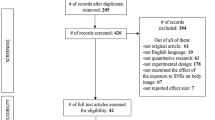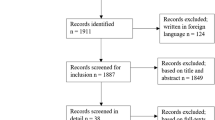Abstract
The current research focuses on how the use of “skeuomorphs” in digital design interacts with an illusion of control to influence gambling behavior. Skeuomorphism is a design concept in which an aspect of a modern item is made to represent its outdated counterpart, even if this representation serves no functional purpose, such as hands “dealing” cards or horses “racing” on the screen of a digital machine. It is proposed that the inclusion of these non-essential links to physical objects in digital gambling games interacts with a player’s illusion of control over the outcome to influence behavior. Shown across a pretest and three experiments, the inclusion of skeuomorphic elements in the design of gambling games, compared to a minimalistic “flat” design, increases amount gambled. Additionally, skeuomorphism and manipulated illusion of control interact to further increase the amount gambled. The manuscript concludes with a discussion on the practical, theoretical, and policy implications of this research.


Similar content being viewed by others
References
Alloy, L. B., & Abramson, L. Y. (1979). Judgment of contingency in depressed and nondepressed students: Sadder but wiser? Journal of Experimental Psychology: General, 108(4), 441–485.
American Gaming Association (AGA). (2017). State of the states 2017: The AGA survey of the casino industry. Retrieved from https://www.americangaming.org/wp-content/uploads/2017/10/2017-State-of-the-States.pdf. Accessed 10 July 2020.
Armstrong, T., Rockloff, M., & Browne, M. (2018). An exploration of how simulated gambling games may promote gambling with money. Journal of Gambling Studies, 34, 1165–1184.
Atasoy, O., & Morewedge, C. K. (2018). Digital goods are valued less than physical goods. Journal of Consumer Research, 44(6), 1343–1357.
Barsalou, L. W. (2008). Grounded cognition. Annual Review of Psychology, 59, 617–645.
Basalla, G. (1988). The evolution of technology. Cambridge: Cambridge University Press.
Bouts, P., & Van Avermaet, E. (1992). Drawing familiar or unfamiliar cards: Stimulus familiarity, chance orientation, and the illusion of control. Personality and Social Psychology Bulletin, 18(3), 331–335.
Brajnik, G., Yesilada, Y., & Harper, S. (2011). The expertise effect on web accessibility evaluation methods. Human-Computer Interaction, 26(3), 246–283.
Burger, J. M. (1993). Individual differences in control motivation and social information processing. In G. Weary, F. Gleicher, & K. L. Marsh (Eds.), Control motivation and social cognition. New York, NY: Springer.
Carr, A. (2012). Will Apple’s tacky software-design philosophy cause a revolt? Retrieved from http://www.fastcodesign.com/1670760/will-apples-tacky-softwaredesign-philosophy-cause-a-revolt. Accessed 10 July 2020.
Cowley, E., Briley, D. A., & Farrell, C. (2015). How do gamblers maintain an illusion of control? Journal of Business Research, 68(10), 2181–2188.
Cummings, L. E. (1997). A typology of technology applications to expedite gaming productivity. Gaming Research and Review Journal, 4(1), 63–79.
Cummins, L. F., Nadorff, M. R., & Kelly, A. E. (2009). Winning and positive affect can lead to reckless gambling. Psychology of Addictive Behaviors, 23, 287–294.
Dixon, M. R. (2000). Manipulating the illusion of control: Variations in gambling as a function of perceived control over chance outcomes. The Psychological Record, 50(4), 705–719.
Dixon, M. R., Hayes, L. J., & Ebbs, R. E. (1998). Engaging in ‘illusory control’ during repeated risk-taking. Psychological Reports, 83(3), 959–962.
Greif, S. 2013. Flat pixels: The battle between flat design & skeuomorphism. https://www.amazon.com/Flat-Pixels-Battle-Between-Skeuomorphism-ebook/dp/B00BCSBAWG.
Harrigan, K., MacLaren, V., Brown, D., Dixon, M. J., & Livingstone, C. (2014). Games of chance or masters of illusion: Multiline slots design may promote cognitive distortions. International Gambling Studies, 14(2), 301–317.
Harrison, G. W., Martinez-Correa, J., & Swarthout, J. T. (2015). Reduction of compound lotteries with objective probabilities: Theory and evidence. Journal of Economic Behavior & Organization, 119, 32–55.
Hayes, A. F. (2013). Introduction to mediation, moderation, and conditional process analysis: A regression-based approach. New York: Guilford Press.
Henslin, J. M. (1967). Craps and magic. American Journal of Sociology, 73, 316–330.
Hooten, E. R., Hayes, S. T., & Adams, J. A. (2013). Communicative modalities for mobile device interaction. International Journal of Human-Computer Studies, 71(10), 988–1002.
Interactive Design Foundation (IDF). (2017). Skeuomorphism is dead, long live skeuomorphism. https://www.interaction-design.org/literature/article/skeuomorphism-is-dead-long-live-skeuomorphism. Accessed 10 July 2020.
Knappett, C. (2002). Photographs, skeuomorphs and marionettes: Some thoughts on mind, agency and object. Journal of Material Culture, 7(1), 97–117.
Ladouceur, R., & Sévigny, S. (2005). Structural characteristics of video lotteries: Effects of a stopping device on illusion of control and gambling persistence. Journal of Gambling Studies, 21(2), 117–131.
Ladouceur, R., Tourigny, M., & Mayrand, M. (1986). Familiarity, group exposure, and risk-taking behavior in gambling. The Journal of Psychology, 120(1), 45–49.
Langer, E. J. (1975). The illusion of control. Journal of Personality and Social Psychology, 32(2), 311–328.
Langer, E. J., & Roth, J. (1975). Heads I win, tails it’s chance: The illusion of control as a function of the sequence of outcomes in a purely chance task. Journal of Personality and Social Psychology, 32, 951–955.
Ma, X., Kim, S. H., & Kim, S. S. (2014). Online gambling behavior: The impacts of cumulative outcomes, recent outcomes, and prior use. Information Systems Research, 25(3), 511–527.
Meissner, P., & Wulff, T. (2016). Debiasing illusion of control in individual judgment: The role of internal and external advice seeking. Review of Managerial Science, 10(2), 245–263.
Miyazaki, A. D., Brumbaugh, A. M., & Sprott, D. E. (2001). Promoting and countering consumer misconceptions of random events: The case of perceived control and state sponsored lotteries. Journal of Public Policy & Marketing, 20(2), 254–267.
Nevada Gaming Control Board (NGCB). (2019). Operation of gaming establishments. Retrieved from https://gaming.nv.gov/modules/showdocument.aspx?documentid=256. Accessed 10 July 2020.
Page, T. (2014). Skeuomorphism or flat design: Future directions in mobile device user interface (UI) design education. International Journal of Mobile Learning and Organisations, 8(2), 130–142.
Pelet, J. E., & Taieb, B. (2017). From skeuomorphism to flat design: When font and layout of m-commerce websites affect behavioral intentions. In F. Martínez-López, J. Gázquez-Abad, K. Ailawadi, & M. Yagüe-Guillén (Eds.), Advances in national brand and private label marketing (pp. 95–103). Cham: Springer.
Presson, P. K., & Benassi, V. A. (1996). Illusion of control: A meta-analytic review. Journal of Social Behavior and Personality, 11(3), 493–510.
Sanchez, E. (2012). Skeuominimalism—The best of both worlds. Retrieved from http://edwardsanchez.me/blog/13568587. Accessed 12 Jan 2018.
Schüll, N. D. (2005). Digital gambling: The coincidence of desire and design. The Annals of the American Academy of Political and Social Science, 597(1), 65–81.
Schüll, N. D. (2012). Addiction By design: Machine gambling in Las Vegas. Princeton: Princeton University Press.
Taylor, L. F., Macaskill, Anne C., & Hunt, M. J. (2017). Realistic free-spins features increase preference for slot machines. Journal of Gambling Studies, 33, 555–577.
Watson, D., Clark, L. A., & Tellegen, A. (1988). Development and validation of brief measures of positive and negative affect: The PANAS scales. Journal of Personality and Social Psychology, 54(6), 1063–1070.
Welte, J. W., Barnes, G. M., Tidwell, M. C. O., Hoffman, J. H., & Wieczorek, W. F. (2015). Gambling and problem gambling in The United States: Changes between 1999 and 2013. Journal of Gambling Studies, 31(3), 695–715.
Wilson, R. A., & Foglia, L. (2013). Embodied cognition. Stanford Encyclopedia of Philosophy. Retrieved from https://stanford.library.sydney.edu.au/entries/embodied-cognition/#toc. Accessed 10 July 2020.
Yarritu, I., Matute, H., & Vadillo, M. A. (2014). Illusion of control: The role of personal involvement. Experimental Psychology, 61(1), 38–47.
Ziemkiewicz, C., Ottley, A., Crouser, R. J., Yauilla, A. R., Su, S. L., Ribarsky, W., et al. (2013). How visualization layout relates to locus of control and other personality factors. IEEE Transactions on Visualization and Computer Graphics, 19(7), 1109–1121.
Author information
Authors and Affiliations
Contributions
All authors contributed to the study conception and design. Material preparation, data collection, and analysis were performed by all authors. Drafts of the manuscript were written and edited by all authors. All authors read and approved the final manuscript.
Corresponding author
Ethics declarations
Conflict of interest
The authors declare that they have no conflict of interest.
Ethical Approval
All procedures performed in studies involving human participants were in accordance with the ethical standards of the authors’ institutions and under delegated authority of the 1964 Helsinki declaration and its later amendments or comparable standards.
Additional information
Publisher's Note
Springer Nature remains neutral with regard to jurisdictional claims in published maps and institutional affiliations.
Appendices
Appendix A


Appendix B: Example of skeuomorphic dice used in Study 2 and Study 3

NOTE: This die was shown for the “3” outcome. Similar dice were shown for all other numbers.
Rights and permissions
About this article
Cite this article
Meng, M.D., Leary, R.B. The Effect of Skeuomorphic Digital Interfaces on the Illusion of Control over Gambling Outcomes. J Gambl Stud 37, 623–642 (2021). https://doi.org/10.1007/s10899-020-09961-2
Published:
Issue Date:
DOI: https://doi.org/10.1007/s10899-020-09961-2




